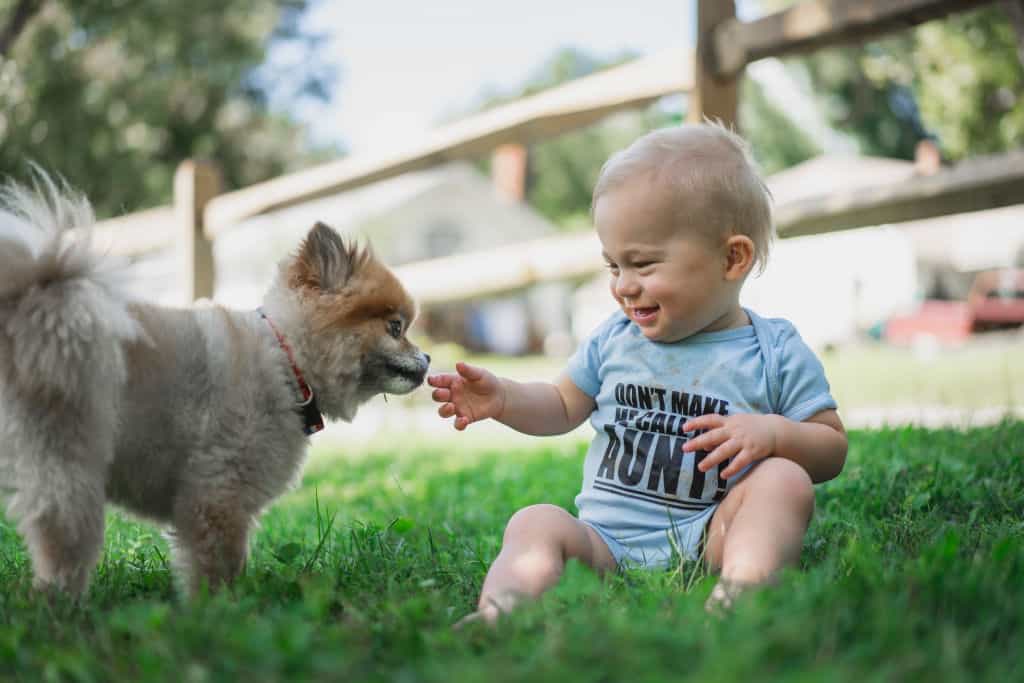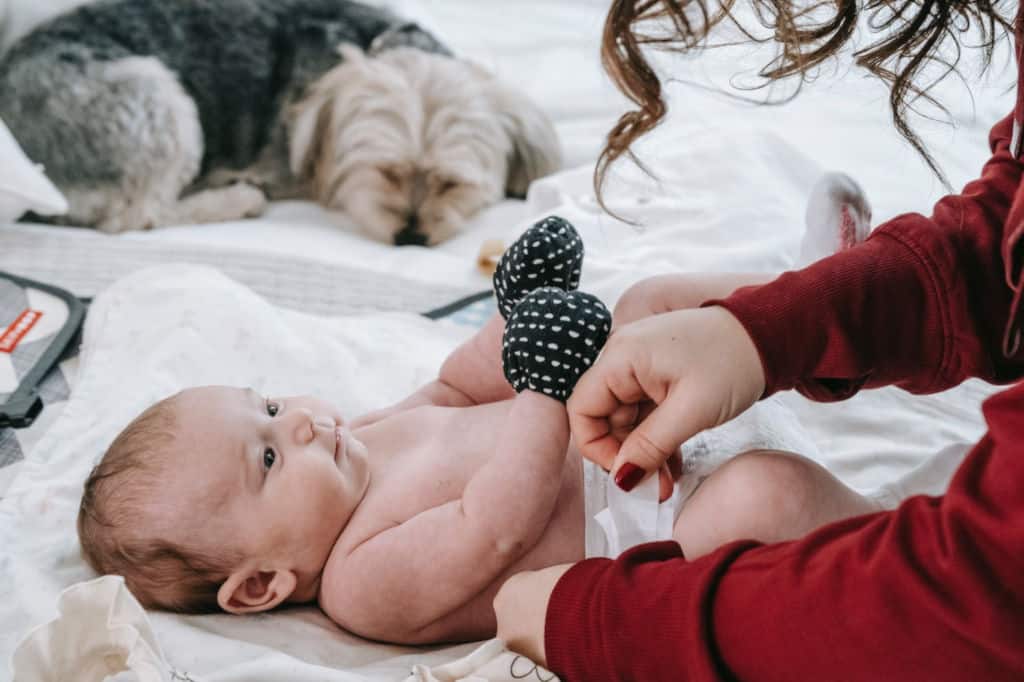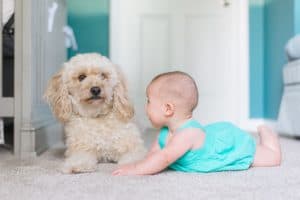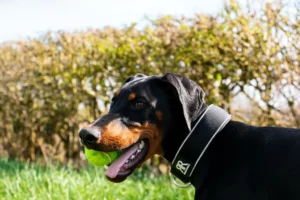Sometimes babies laugh so much at dogs that we begin to wonder if there is a specific reason for that.
Since it’s generally easy to make babies laugh, and dogs are always so amusing and weird-looking, babies laugh at them. Interacting with dogs can also increase serotonin and dopamine levels, which are the chemical building blocks of pleasant sensations.
One of the significant advantages of bringing newborns into contact with dogs is that dogs make babies happy. Observing your baby and dog at play can be a joyful experience.
Let’s look at why babies laugh, how it affects dogs, and how to ensure a safe environment for everyone.

Why Do Babies Laugh in General?
Laughter is a profoundly ingrained evolutionary mechanism for forming social interactions. You cannot force genuine laughter, which is why we laugh significantly less alone than in groups.
Adults generally laugh at funny things.
Babies, on the other hand, laugh mostly during social interactions or when they encounter novel experiences. As a result, it is most likely an evolutionary benefit. The adult is flattered because they believe the infant finds them amusing. The baby chuckles to attract attention and learn from adults.
From an evolutionary standpoint, they are essentially emulating adults to maximize their own chances of survival.
Babies laugh for the purposes of social communication. According to Gina C. Mireault, Ph.D., “laughter serves as a kind of social glue… Its value as a social signal and mammalian superglue explains why it comes “factory-installed” as part of infants’ native hardware. From an evolutionary perspective, this joint emergence of laughter and sociability is wise.”
It’s also effortless to make a baby laugh. Laughter is a natural reaction to finding something amusing. Finding something funny is frequently the result of a subversion of expectations. You anticipate one thing, and then something unexpected occurs.
Babies’ expectations are in such flux due to their lack of experience in life that it’s relatively easy to disrupt them. Everything is amusing to them. As a result, they laugh a lot.
In some rare cases, humor is built on surprise. Babies associate humor with fear, so you may scare them, and they respond with laughter.
Does Having a Baby Affect Dogs’ Behavior?
Babies and toddlers are unpredictable, which makes it difficult for dogs. While dogs are like having a child, even the most well-behaved dogs might be startled by babies or small children. We never leave our dog alone with our newborn, supervise interaction, and train the dog to feel at ease in the baby’s presence.
While I adore dogs, you can’t trust dogs and babies together. They are instinctive beings. The “play” can get too rough at any time. Regardless of the dog’s trustworthiness, continually monitor the dog-baby human contact.
Consider the dog’s current behaviors, which may be bothersome or dangerous when the baby arrives (such as jumping). Before the baby is born, work on specific behaviors.
Always try to introduce the dog to toddlers and babies in a safe manner. Or, at the very least, baby sounds on your phone. In the same way, you would read books to a toddler and tell them about a new sibling.
I recommend putting up baby gates everywhere so you may be together but not touch. These baby gates keep the dogs away from the infant and the baby away from the dogs. A fence in the baby’s room keeps pet hair out of at least one room.
Never force the dog into interacting with the child. Reward and compliment them for any caring interaction. Leaving any dog alone with a baby is never safe, no matter how much you trust the dog.
Babies will occasionally grab the dog, climb on it, and reach into their mouth to retrieve the toy she is chewing on. While the dog can be gentle, please do not leave them alone, and be mindful that accidents occur. When your dog plays, they may knock the baby over or scratch them with a claw.

What Do Dogs Think When We Laugh?
Feral dogs and dogs who haven’t been socialized with people have no frame of reference – it’s like learning a new language. But dogs that grow up with people are very observant and sensitive to their feelings and actions, so they learn that people laugh when something happy or silly happens.
Dogs read their owners remarkably well. When most people can’t tell what I’m thinking or feeling by my look, my dogs seem to know. And they behave accordingly by being cheerful, happy, and moving up and down. They wiggle their butt and become alert or depressed.
Many dogs will become agitated, desire to jump on you, or bark and whine in response to the fun or joke. I’ve had dogs start “singing,” poke me with their noses, and do other things to signal they want to be a part of the fun.
When you laugh, dogs sometimes get a little too excited. If this is the case with your dog, you can train them to ignore your laughter.
You must condition the response to the stimulus, which is laughing. A classical training technique would be to treat the dog with a high-value reward every time you laugh, beginning with a low-intensity stimulus (a short/quiet chuckle).
They would eventually get so preoccupied with expecting the reward that they would not engage in the other action. The idea with both is to start slowly and gradually increase the stimulation (laughing) so you don’t trigger the unpleasant habit.
FAQs
Why do dogs defend their pregnant owners?
Hormonal shifts may explain why dogs behave differently near pregnant women. Your dog can detect scents that you cannot, which is undoubtedly tied to pregnancy and maybe stress. Another reason they modify their attitude is that they perceive them as weaker and less capable of defending themselves.
Why do babies laugh while sleeping?
Babies giggling in their sleep are regarded as perfectly natural. While asleep, they can chuckle, groan, grunt, or even cry and open their eyelids. It has to do with the development of their neurological system. However, it can also be a sign of a neurological problem in rare cases.
At what age do babies start laughing?
Around month three or four, most newborns will start giggling. Don’t be alarmed if your kid isn’t laughing at four months. Each infant is unique. Some babies will laugh before others. Some babies might begin to chuckle as early as two months, while others will start at month seven.
Alex, a passionate animal lover, has experience in training and understanding animal behavior. As a proud pet parent to two dogs and three cats, he founded AnimalReport.net to share insights from animal experts and expand his knowledge of the animal kingdom.









